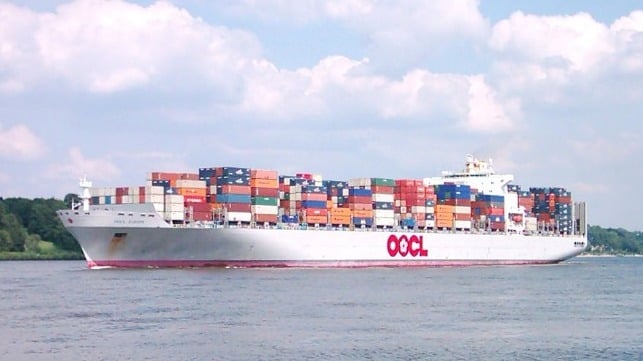Bankrupt Retailer Bed Bath & Beyond Files $32M Complaint Against OOCL

Continuing the ongoing complaints from shippers against carriers over the service problems during the past few years, bankrupt retailer Bed Bath & Beyond has filed a blistering complaint against Orient Overseas Container Line (OOCL) and OOCL (Europe) with the Federal Maritime Commission (FMC). Saying the retailer was “coerced,” “exploited” with price inflation in container shipping, and “deliberately” denied space, Bed Bath and Beyond details more than $25 million in excess costs above its contracts and approximately $6.4 million in D&D fees it contends resulted by OOCL’s business practices between 2020 and 2022.
While retailers and shippers have filed FMC complaints over the failure of the carriers to provide service under their contracts or excessive detention and demurrage (D&D) fees, Beth, Bath & Beyond comes out swinging in its complaint alleging systematic failings, deliberate acts, coercive behavior forcing premium pricing, and a shipping company in a “profit-maximizing frenzy,” during the surge in container volumes over the past three years.
Once a popular retailer at the beginning of 2020, the company was operating nearly 1,000 Bed Bath & Beyond stores and a total of 1,500 retail stores in addition to its robust online business. Issues that had been building for years in its business were compounded by the pandemic. In 2018-2019, the company slipped into the red reporting losses that continued to mount until April 23, 2023, when it filed for liquidation under U.S. bankruptcy laws.
Bed Bath & Beyond reported as of November 2022 it had $5.2 billion in debt. Struggling with rising costs, a lack of inventory, and declining sales, the company had dwindled to just 360 of its brand-name stores and 120 stores in its other chains
The complaint with the FMC alleges that OOCL adopted three strategies to take advantage of the crisis in the shipping markets and “impose unjust and unreasonable costs,” that contributed to the company’s financial troubles. The complaint does not directly cite the bankruptcy, but says in addition to the direct expenses cited in the 35-page complaint, the company incurred other injuries, including delays, reduced inventory, unnecessary expenses, and lost profits due to the shipping problems.
They allege the carrier systematically failed to meet its service commitments under the annual contracts and allocated bargained-for space to other shippers to maximize the carrier’s profits. In the 2020-2021 contract, they report having a commitment for 2,100 forty-foot containers. They calculate that OOCL only carried 1,475 forcing the retailer to seek carriage or forgo shipments of 624 containers. The same happened in 2021-2022 where they report OOCL in the first six months of the contract provided only 53 percent of the contracted space and coerced the company into ultra-high premium rates.
During the first year’s contract, Bed Bath and Beyond says it paid $7.1 million in costs over contracted rates and spent an additional $2.2 million in the spot market to cover shortfalls in capacity. The following year the retailer says it paid $6.6 million in overages and spent $9.4 million in the spot market. Over the two years, that adds up to over $25 million in shipping costs.
Bed Bath & Beyond does not stop with the shipping costs also citing the D&D practices saying they were being billed when it was not possible to move containers. Over the two years, the complaint calculates it incurred approximately $6.4 million in D&D fees.

that matters most
Get the latest maritime news delivered to your inbox daily.
Bed Bath & Beyond’s complaint further accuses OOCL of knowingly failing to meet its service obligations. They say by December 2020 OOCL “brazenly demanded,” that the retail pay Peak Season Surcharges to “have any reasonable chance of getting its freight carried.” The complaint states the retailer paid a premium of nearly $12.7 million which could have been avoided had the respondent fulfilled its service commitments.
The complaint cites the previous writing of the FMC’s Chief Judge who found abuses like the ones in this complaint are of “national importance.” Any monies the retailer recoups from the case would only make a small contribution to the overall size of the bankruptcy estate, but the company says the unlawful practices need to be stopped before they become the industry standard for the global container lines.
